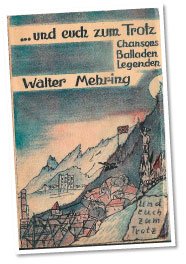The second author I would like to introduce to you is a German-Jewish satirist who was persecuted by the Nazis but could escape in a spectacular way. Two months ago I wrote the first article for this series. Now the second is to follow. Since I write many different series at the same time, paint, movies etc. it can take some time until the next article, but I try not to let you wait two more months.

Let's get to Walter Mehring. He was born in Berlin in 1896 and his "unpatriotic behavior" was already noticeable at school, so he could not take his high school diploma at his high school. His interest was early in art, and he studied two and a half semesters of art history in Berlin and Munich. During this time he began to write the first poems for the art magazine "der Sturm", a magazine which could only be sold inofficially, because Expressionism was considered offensive to the government of Emperor Wilhelm, with its classical magesty praising art.
- A poem by Mehring spoken with the Berlin dialect.*
At first, Mehring had dreamed of a life as an artist, but when he visited an exhibition of Van Gogh he did not think he could create anything of this great value. In the circle around the magazine "der Sturm" he met critical authors of the time, including Erich Mühsam, whom I presented in my first post of the series.
In 1919 his chanson works were performed in the circus Schumann in Berlin. Here is a video of a performance of one of his chansons in 1985:
In 1929, his play "Der Kaufmann von Berlin" was premiered at Volksbühne in Berlin, which led to a great furore. At the gates of the theater, the SA demonstrated, while in the theater Nazis threw stink bombs. Joseph Goebbels, Nazi propaganda minister, responded in his paper "der Angriff" to the piece in which Mehring states: "Now that you know how everything can end, never forget how it began." with an article on him. The article was titled "To the gallows.
Walter Mehring escaped from the gallows by the help of a friend, who was waiting for him in the night before the Reichstagsbrand, and begged him to flee to Paris. The mother Mehring did not escape from Berlin and was deported and murdered in concentration camp Auswitz.

In exile, he published a chanson, ballad and legendary collection entitled "... and you in spite of it" in 1934, in which he published this poem:
"That this time will teach us to sing again
The good songs of an evil mock
Even if our hearts and minds were not for us
Only in spite of you!
And sing, until it is against you
And put a wedge into the coarse log!
And that there is something to deface our breast!
And to comfort us! And in spite of you ... "
- This poem is also very impressive: *
The volume of poetry could not be expelled neither in Germany nor in Austria, since, according to Franz von Papen, it would hurt the "Aryan feeling". Mehring lived in Vienna at that time and was able to escape to Switzerland at the last minute. From there he returned to Paris. When the Nazis invaded France, he fled to Marseilles. From there he wanted to flee to Spain, but was caught on the way by secret police. His escape from the concentration camp succeeded him with a fantastic trick: at a favorable moment he crept to the camp exit and entered the guards hut, where two French soldiers were eating breakfast. When they asked him what he wanted, he said, "I want to see my brother, Mr. Mehring, here in the camp, I've heard he's interned here." Asked if he had a permission to visit, he replied negatively, whereupon he was swept out of the camp. He was then able to reside with a farmer in Marseilles until 1941, when he escaped to the United States in a loader room of a freighter.
After the war, Mehring returned to Europe. In the period up to the end of the war, he had written 30 books, which were nowhere to be found in post-war Germany. He died in Zurich in 1981. The plays of Walter Mehring and his books have not been adequately appreciated.
Thank you very much for reading. I really appreciate your support and I hope you find my writings interesting. If you are curious about the other author I wrote about - who is one of my favorite authors by the way - you can find the article below. The German articles are available too.



